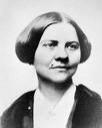Lucy Stone 1818 - 1893
November 22, 2007
 Lucy
Stone 1818 - 1893 was a
natural born
suffragist
and
abolitionist.
She was a friend of homeopath Elizabeth Cady
Stanton
and a founder member of the National Woman Suffrage
Association,
and later the American Woman Suffrage
Association.
Lucy
Stone 1818 - 1893 was a
natural born
suffragist
and
abolitionist.
She was a friend of homeopath Elizabeth Cady
Stanton
and a founder member of the National Woman Suffrage
Association,
and later the American Woman Suffrage
Association.
Lucy Stone was married to Henry Blackwell (1825-1909). Emma Stone Lawrence, niece of Lucy Stone, was married to George Washington Blackwell (1832-1912) (http://oasis.lib.harvard.edu/oasis/deliver/~sch00050).
In the early 19th century, Lucy Stone wanted a good education, but the only college in the world that accepted women at that time was in Brazil. She was prepared to go.
Luckily, Oberlin University was founded in 1835 in Ohio, the first U.S. college to accept both women and African-American students. Stone enrolled and graduated in 1847. However, when it came time to seek a profession, the only field open to women was teaching.
In 1849 (the year Elizabeth Blackwell graduated from Geneva Medical College in New York), Lucy Stone wrote:
"We believe that if the system of educating females for physicians be generally adopted, a great amount of suffering and death will be saved."
Stone married Henry Browne Blackwell, Elizabeth Blackwell’s brother in 1855 but insisted on keeping her maiden name. They both became activists in the antislavery and women’s rights movements.
Stone championed homeopathic supporter Elizabeth Stuart Phelp’s book The Story of Avis which depicts women’s three-role status as mother, wife and person. Phelps also wrote Dr. Zay, a novel about a homeopathic physician. Stone also praised Abbie Holmes Christensen’s book Afro American Folk Lore.
Stone assisted homeopath Harriet Hanson Robinson and supported women’s dress reform. Stone produced her own journal The Woman’s Journal for over twenty years, and she also wrote for the magazines The Lily, published by Amelia Bloomer, and The Sibyl, published by Lydia Sayer Hasbrouck.
The Woman’s Journal, included praise-filled mentions of both the regular New England Hospital for Women and Children begun by the NEFMC’s disaffected lady managers as well as the homeopathic and coeducational Boston University School of Medicine where Mercy Bisbee Jackson joined the faculty when it opened in 1873. It also promoted the practices of select female homeopaths and regulars in its columns.
Stone was known as the ’silver voice’ of women’s suffrage and abolitionism and she was a fearless woman who never faltered:
Lucy was hired by the American Anti-Slavery Society as a lecturer. Speaking on the controversial subject of abolition was dangerous for anyone, much less a woman who in many opinions shouldn’t be speaking out at all. All sorts of tactics were used to try and break up the lectures and meetings, but Lucy was almost never stopped.
Her daughter records, “Once, in the winter, a pane of glass was taken out of the window behind her, the nozzle of a hose was put through, and she was suddenly deluged with cold water in the middle of her speech. She put on a shawl and went on with her lecture.”
Stone spoke at the funeral of homeopathic enthusiast Sarah Moore Grimke, an ardent supporter of educating African Americans after the Civil War, along with Theodore Weld and his wife Angelina, whose work was enabled by homeopath Diocletian Lewis.
Stone spoke out for homeopathic supporter Frederika Bremer, and for the Hopedale Community who employed homeopath Emily Gay. Stone supported the popular hydrotherapy cure which was influenced by homeopathy.
Stone’s influence was pervasive and even reached Iceland, and today the Lucy Stone League still supports women who wish to keep their own name on marriage.
The National Woman Suffrage Association and American Woman Suffrage Association merge into theNational American Woman Suffrage Association, largely through the efforts of Orange, New Jersey-born suffragist Alice Stone Blackwell, 32, who since 1882 has edited the leadingSuffragist newspaper, The Woman’s Journal.Blackwell is the only child of Lucy Stone and Henry Blackwell.